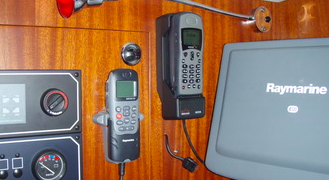Offshore sailors should carry a satellite phone for emergencies, recommends Coastguard
HM Coastguard last week issued what I consider a game-changing statement by recommending that all offshore sailors carry satellite phones for emergencies. It’s time, they are more or less saying, to put rescue services on speed dial.
Following the helicopter rescue of a solo sailor whose 22ft boat had been knocked flat repeatedly in Force 9 conditions the last week, Falmouth coastguard issued a statement stating: ‘For offshore voyages leisure sailors are recommended to carry a satellite form of communication.’
The sailor, Peter Evans, who was sailing a Folkboat named Federwolke towards the Azores, had no long-range form of communication on board and had set off his EPIRB. The alert was received and a helicopter from RNAS Culdrose and Lizard lifeboat were tasked.
He was airlifted off and his boat was later found and salvaged to Salcombe.
Falmouth Coastguard’s exhortation to carry satphones (see this press release), even though the equipment is not an official part of the global GMDSS armoury, is a telling indication of how rescues are often conducted these days.
In the last month, I have interviewed two skippers who were rescued from their boats after being holed mid-ocean and contacting the Coastguard by satellite phone. They are in no doubt that this was a far safer, more immediate and more reassuring method than trying to raise someone on long-range radio or setting off an EPIRB.
“It makes life enormously easier for us if we can be in direct touch, because then we can establish what the problem is,” comments James Instance, watch manager at MRCC Falmouth. “An EPIRB is fantastic, but although it indicates position it doesn’t say what kind of distress it is.”
The increase in satellite communications means that Falmouth Coastguard receive distress calls from way outside their North Atlantic jurisdiction, sometimes from the other side of the world. They have no problem with this and are happy to co-ordinate rescues from far afield or to relay information to local services.
This seems to apply to every other MRCC worldwide. One Dutch skipper I spoke to whose boat had been split open at the bow after a collision with a sperm whale 330m east of Bermuda had chosen to call the Coastguard in the Netherlands so he could speak in his own language. The distress and details were passed on to the Bermuda Rescue Co-ordination Centre, which tasked a plane and a ship.
Some people have suggested that the increase in satphones on board yachts has caused people to abandon yachts after, say, a rig failure or rudder problem who might have been able to stay and make port safely after the initial panic. To support this view there have been at least five cases in the last few years that I can think of where crews were rescued and the boats later found floating and salvageable.
The difficulty seems to me to be that while satphones correctly encourage people to call as soon as they have a serious problem, it meanwhile sets off a chain of events over which they soon have no control. This usually includes the diversion of a ship.
When the ship arrives on scene the skipper and crew have a torturous decision to make about whether to abandon to safety (albeit that the evacuation itself is often highly perilous) or to stay and try to cope. This is an impossible dilemma for most skippers surrounded by a crew of family or friends. Judging by the cases I have followed, they almost always leave.
But Falmouth Coastguard argues dialling in with a problem is not a clear case of ‘yachting 911’. They say that a satellite phone call alert can lead to a far more adaptable rescue strategy.
“With an EPIRB or a Mayday, assets will be immediately tasked. With a phone call, we would talk to you, get a good conversation, discuss your situation and it’s more of an agreed action,” says James Instance.
“In case of damage or dismasting where people were OK we would set up a communications schedule, maybe call you every 30 minutes and then if things settle every hour or every three hours. But if the situation changes we can tell you how many ships are within a radius and put in places some measures to get assets to your position.
“From our point of view we can monitor and keep a record of your position, course and speed and from your point of view you have the reassurance that someone is keeping an eye out for you.”
Falmouth Coastguard also recommends adding an on board satellite phone number to your EPIRB registry details and leaving it with onshore contacts, so that know the number to call if ever they receive a distress signal.
“With better technology more readily available and decreasing in price, this is our suggestion if you are looking for additional safety equipment,” says Instance. “It won’t come into the official GMDSS mould, but the equipment is there and it’s practical to use it.”
Do let us know your comments and observations on this issue. We will be following up in our August issue of the magazine.




